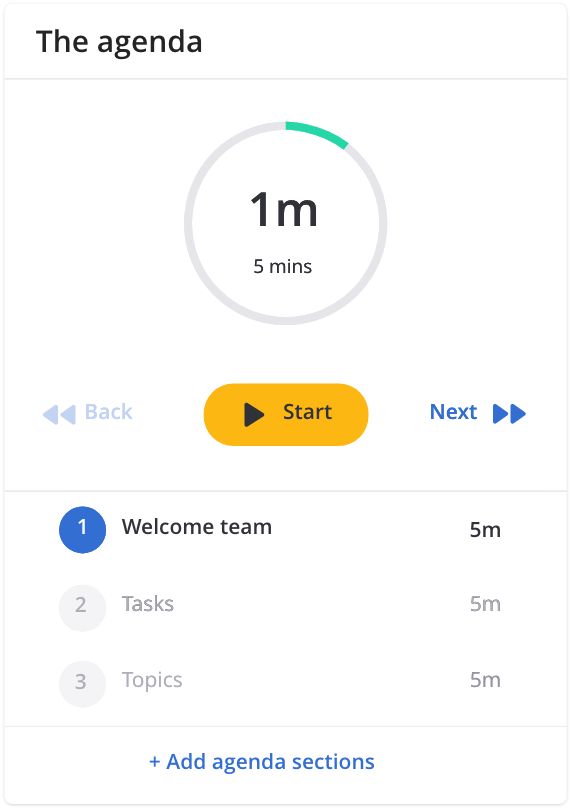Ever felt stuck in a meeting that ran over time? Have you ever left a meeting without a clear action plan? Is most of your meeting time spent on brainstorming rather than making decisions?
If you’ve answered “yes” to any of these questions, you’re not alone. We’ve all been in underwhelming meetings. But no matter what, meetings are an essential part of team collaboration. A timed agenda can help you make the most of your meetings. It’s a useful tool to plan more effective and efficient meetings by ensuring your team stays on-task and on-topic.
What is a timed agenda?
It’s just what the name says! It’s a way to assign time to each of your meeting agenda sections. For example, you can choose exactly how much time you’d like to spend on reviewing metrics, checking in on tasks, discussing topics, etc. After you allocate time to each of your agenda items, you can keep the time as you move through the meeting.
By assigning times to agenda items, you’ll ensure your meeting stays on-track while wrapping up on-time. Likewise, it’ll encourage your teammates to come prepared to the meeting, ready to make decisions about particular topics.
Traditionally, agenda setting is handled by one team member. But with meetings.io, your meeting is linked to an automatic agenda and timer—allowing you to spend less time managing the meeting, and more time driving actionable, efficient results.

Timed Meeting Agenda Tips
Our meeting experts chimed in with some tips to make sure that your timed agenda results in the best business meeting ever.
- Be realistic. How much time will you need to discuss and complete each agenda item? Does your team agree with the times you set?
- Use your topic section throughout the meeting. Try to hold back from discussing topics as they arise. When a new topic comes up, just add it to your topics list, and return to the agenda item at hand. Then, when it’s time to problem-solve, you’ll have all your topics documented and ready for discussion.
- Don’t spend too much time on one agenda section. If you find that one agenda section is monopolizing your time or preventing you from discussing topics, it’s time to take a step back. Ask yourself and the team if you really came to the meeting prepared enough to make decisions. If not, take some to-dos for your next meeting and refocus on other, more pressing topics.
- Define the purpose of your meeting. Invite the most valuable participants to accomplish your goals. If you’re not sure whether someone should attend, they probably shouldn’t (but it never hurts to ask!).
- Create your timed meeting agenda in advance. This has several advantages: you can share it with your team before the meeting, narrow down the meeting goals and help identify who should be in the meeting room.

